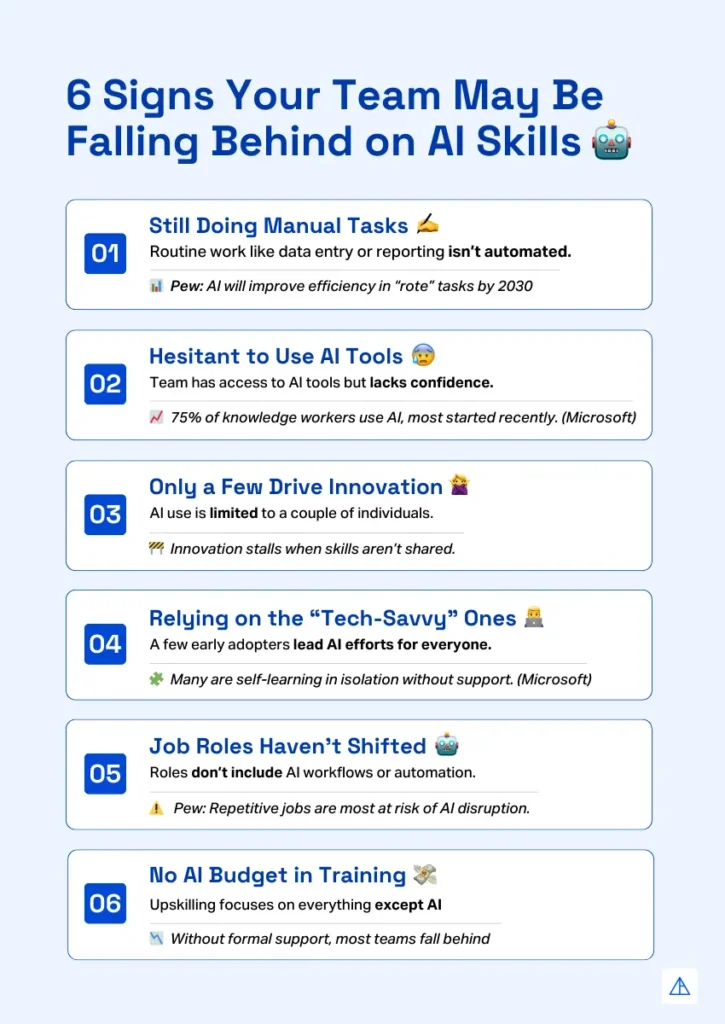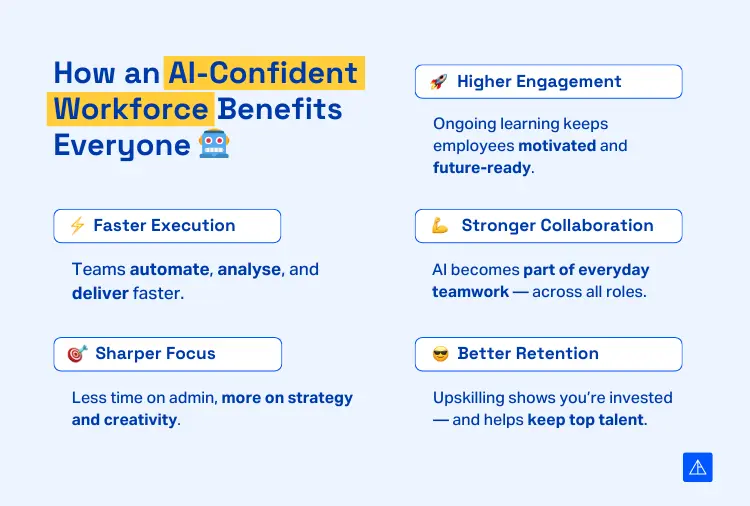Many organisations have introduced AI tools across departments, but integrating isn’t the same. While some employees embrace AI, others feel left behind, unsure of where to start or how it fits into their day-to-day work. That’s where things start to slip.
According to the Pew Research Center, AI will be embedded into most human activities by 2030. The businesses that thrive will have AI-savvy teams who not just use AI but are well-equipped to apply it and build AI workflows
Without that capability, your workforce could already be facing hidden risks:
💬 Struggling with tool adoption or ignoring AI completely
⏳ Spending too much time on tasks that could be automated
📉 Falling behind competitors who are moving faster with AI-driven teams
📊 Relying on a few individuals to “figure out the AI stuff”
🔁 Lacking a clear plan for AI learning or professional development
The good news? It’s not too late to turn this around, but the first step is awareness. This article will explore 6 unmistakable signs your team may be at risk without AI skills, what those gaps look like in real workplaces and practical ways to close the AI skills gap with training that benefits both employees and the business.
Related Article: The Future Impact of AI: Preparing Your Workforce for What’s Next
What are the 6 Indicators Your Workforce May Be Falling Behind on AI Skills?
Spotting the signs of an AI skills gap early can help you take action before it affects performance, morale, or innovation. Here’s what to watch for:
1. Manual Processes Are Still the Norm
If your team spends hours on routine tasks like data entry, reporting, or content drafting, they’re likely missing opportunities to automate with AI. According to the Pew Research Center, AI will significantly enhance efficiency in “rote” tasks but only for teams that know how to use it.
2. Employees Avoid or Underuse AI Tools
Many teams have access to AI platforms like ChatGPT, Notion AI, or Grammarly, but access doesn’t equal confidence. The Microsoft Work Trend Index found that while 75% of knowledge workers use AI, most started recently and without formal guidance. A lack of training often leads to hesitation, underuse, or inconsistent adoption.
3. Innovation Is Isolated, Not Organisational
When only one or two team members are experimenting with AI while the rest stick to traditional methods, your innovation pipeline is running too narrow. AI fluency shouldn’t be limited to a few individuals; it must be shared across the entire team.
4. “Tech-Savvy” Staff Are Carrying the Load
If you’re leaning too heavily on a handful of early adopters or younger employees to lead all AI-related work, that’s a sign your broader workforce is underprepared. As Microsoft’s report highlights, many employees are self-learning in isolation, often without the tools or structure to scale their knowledge to others.
5. Job Roles Aren’t Adapting
Roles that haven’t evolved to include AI workflows risk becoming outdated. The Pew Research Center notes that professions that stay static in the face of AI advancement, especially those with repetitive functions, face the most significant disruption risk.
6. Training Budgets Don’t Include AI
Still investing in leadership, compliance, or general upskilling but not AI? You’re overlooking one of the most in-demand capabilities of the modern workforce. Without formal training paths, your team is left to figure it out on their own — or worse, not at all.

Related Article: How AI Trends Are Changing Corporate Learning – And How to Adapt
👉 Not sure where to start? Take Vertical Institute’s Generative AI Quiz to assess your team’s readiness.
GENERATIVE AI QUIZ
Unlock insights into how Generative AI can transform your career.
How to Close the AI Skills Gap
Bridging the AI gap doesn’t mean hiring new teams or investing in complex tech. In most cases, the smartest move is to upskill the people you already have. Here’s how to get started:
🎯 Focus on job-relevant training
AI training needs to be practical, not theoretical. Employees should learn how to apply tools like ChatGPT, AI-powered spreadsheets, or automation platforms directly in their roles, whether in operations, marketing, finance, or admin.
🧠 Support structured, hands-on learning
Many employees are already experimenting with AI tools independently. However, without structured guidance, that learning stays fragmented. Short courses can help teams become confident using AI in real business scenarios without needing a tech background.
Programmes like Vertical Institute’s Generative AI course offer business-focused training that helps professionals upskill quickly without needing a tech background.
Teams already upskilling with AI are gaining the edge — join them with Vertical Institute’s Generative AI Course. 🚀
Generative AI Course
Boost efficiency and enhance productivity using Generative AI.
📅 Make learning part of the workflow
AI isn’t a one-time update. Encourage continuous learning through workshops, peer sharing, and micro-training sessions. The Microsoft Work Trend Index shows that regular, small learning opportunities help drive adoption and reduce resistance.
🤝 Create space for experimentation
Teams need room to explore AI without fear of getting it wrong. Encourage test-and-learn approaches, share use cases internally, and highlight small wins. When people see real impact, confidence builds quickly.
📈 Align training with business goals
Upskilling should support clear outcomes — faster turnaround, smarter insights, and better customer experiences. When training is tied to performance, it’s easier to track ROI and get buy-in from leadership.
Related Article: 7 Essential Skills You’ll Learn in AI Training Courses in Singapore
How an AI-Confident Workforce Benefits Everyone
When teams confidently use AI, the ripple effects go far beyond task efficiency. It changes how people work, collaborate, and contribute to business growth. Here’s how:
⚡ Faster execution
Projects move quicker when teams know how to automate, summarise, and analyse with AI tools.
🎯 Sharper focus
With AI handling repetitive tasks, employees can spend more time on work that requires creativity and strategy.
📈 Higher engagement
People feel more motivated when they’re learning new skills and staying relevant in a changing workforce.
🤝 Stronger collaboration
AI knowledge becomes part of everyday problem-solving across teams, not just within IT or innovation roles.
🔒 Better retention
Providing meaningful upskilling opportunities helps retain top talent who want to grow, not just stay afloat.
According to People Matters, a global HR and work tech media platform, adaptability is one of the strongest signals that an employee will remain relevant as AI reshapes work. Investing in your team’s growth now ensures they’re not just keeping up; they’re leading from within.
Whether you’re training five people or five hundred, creating an AI-literate culture doesn’t have to be complex. Structured programs like Vertical Institute’s Generative AI course make embedding real-world AI fluency into your workflow easier without starting from scratch.

💬 Not sure which AI course fits your goals? Book a free consultation to explore your options and available subsidies.
Discuss your career goals, decide which course is the best for you and understand the government subsidies. 
Book a Free Consultation
FAQs About How to Close the AI Skills Gap
Yes! Vertical Institute provides corporate training that equips professionals with job-ready AI skills. Our Generative AI course is designed for employees with no tech background and includes real-world use cases across industries.
The Generative AI course is 21 hours long and delivered via live Zoom classes in 7 expert-led sessions (3 hours each). It’s flexible, accessible, and built for working professionals.
Yes. Subsidies and support schemes are available for eligible teams or organisations.
SSG Subsidies: Available to Singaporeans and Permanent Residents, with enhanced rates for those aged 40 and above
SFEC (SkillsFuture Enterprise Credit): Eligible SMEs can enjoy up to 90% additional subsidy on the remaining course fees
Absentee Payroll (AP): Supports employers through 400% tax deduction or a 20% cash payout based on nett fee.
Enterprise Innovation Scheme: Additional support for companies investing in workforce development
Do employees receive certification after completing the course?
Yes. Upon completion, participants receive a recognised certificate, which can be a valuable credential for career development and internal progression.
In addition to the Generative AI course, Vertical Institute offers a range of in-demand, industry-relevant courses, including:
Data Analytics
Advanced Data Analytics
Data Science
UI/UX Design
Digital Marketing
Cybersecurity
Blockchain
Conclusion
Identifying the AI skills gap in your talent pool allows you to act strategically before it impacts your business. The most effective intervention doesn’t have to be starting over or re-hiring. It means giving your team the tools, training, and support to stay relevant in an AI-dominated world.
With the right upskilling approach, AI becomes less of a disruption and more of a competitive edge for your business and your people.



